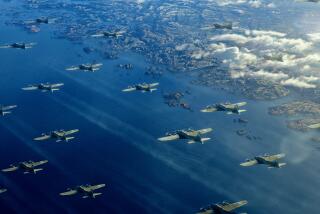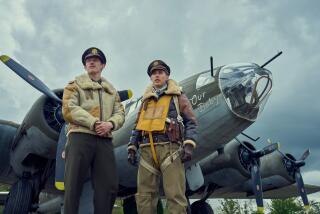Profile : Gen. Horner, Architect of Allies’ Air Success : The man who put together the armada that is ceaselessly pounding Iraqi positions formulated the strategy of swift and unrelenting warfare in the skies over Vietnam.
- Share via
RIYADH, Saudi Arabia — The image on the television screen was truly awesome: a rocket from an American jet is fired toward the Iraqi Air Force command headquarters in Baghdad and disappears into a ventilation shaft in the center of the roof, precisely where it was aimed. A split second later, the building explodes in four directions.
The man describing this scene as the camera rolls is Lt. Gen. Charles A. Horner, the commander of the U.S. Air Force in the Persian Gulf. Somewhat soft-spoken despite his hard-nosed image, Horner praised the pilots conducting the air war against Iraq, saying that he was “very proud of our air crews, by the way they have shown discipline and courage.”
But similar praise had been heaped on Horner himself only minutes before by Gen. H. Norman Schwarzkopf, the U.S. Forces commander, after American and allied fliers appeared to establish firm control of the skies in the early hours of fighting to wrest Kuwait away from Iraqi President Saddam Hussein.
“The one person who will be considered the architect of the entire air campaign is Chuck Horner,” Schwarzkopf said. “He is certainly the one person more than anyone else who is responsible for the magnificent airmen out there conducting this campaign. He is a superb leader, and I am exceptionally proud of the job he is doing.”
Strong words, those.
But at least in the early going, they seem justified. In the opening days of the war with Iraq, Horner has assembled as formidable an air armada as has been seen since the Vietnam War. And he has used it with such devastating effect and frequency that military experts are often quoted as calling it unprecedented. At the weekend, American warplanes had flown more than 8,000 sorties, perhaps the largest number ever put in the air in that short a time. Not a single Iraqi jet entered Saudi Arabian airspace during that time and more often than not they turned tail.
Horner’s pounding of Iraqi targets, with planes often taking off seconds apart for extended periods, is all part of the American game plan to keep the war going at an unrelenting pace, day and night, to make it so horrible for the Iraqis that it will weaken their resolve much more quickly. But while he may be good at it, this warrior has no love for combat.
Talking about America’s troops and their preparations, Horner told a pool of reporters last August that he could understand their eagerness. But at the same time, he said that “if they stop and think, they realize that war is a loser for everyone.”
At another point last December before the fighting broke out, Horner told the Christian Science Monitor that “waris mankind at its most ludicrous state.”
The 53-year-old, three-star general plotting the American air strategy is known as a nuts-and-bolts man who also has more than 4,500 flying hours, including 111 combat missions during the Vietnam War. Indeed, he has said in the past that it was Vietnam, with its gradual escalation and massive casualties, that shaped his view of modern warfare as needing to be swift and unrelenting.
An Iowa native, he is the commander of the 9th Air Force and the U.S. Central Command Air Forces at Shaw Air Force Base in South Carolina. While the Central Command is in the continental United States, it is responsible for the Middle East theater, which contains 70% of the world’s oil reserves.
A graduate of the University of Iowa, Horner went through a succession of promotions and commands, including two Vietnam tours. During that time he earned a number of military decorations, including the Distinguished Service Medal, the Silver Star, the Legion of Merit, the Distinguished Flying Cross and many others. He is married and has two daughters and a son.
Horner’s parents, his sister, brother-in-law and their children were all killed in a 1964 automobile accident while he was away in the military--an event which is said to have left him a different man.
“He thought he would never return from any of those combat missions he flew in Vietnam,” Robert Burgess, a distant relative, told the Associated Press in Des Moines. “I think part of that was that he had no fear anymore because of what he had gone through.”
Ironically, Horner made a speech to the Rotary Club in his native Davenport, Iowa in 1987 in which he said the only reason to be in the Persian Gulf is to protect shipping lanes. According to the account in the Quad City Times, it was “not to take sides in Arabian wars.”
More to Read
Get the L.A. Times Politics newsletter
Deeply reported insights into legislation, politics and policy from Sacramento, Washington and beyond. In your inbox twice per week.
You may occasionally receive promotional content from the Los Angeles Times.










